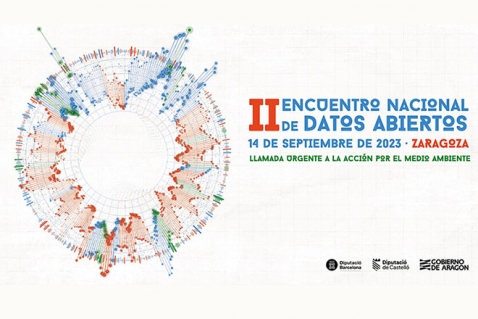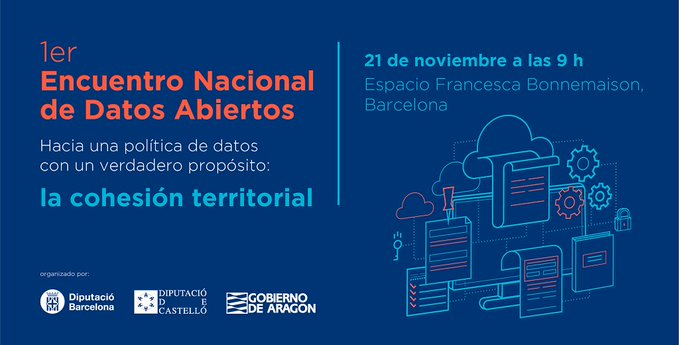II National Open Data Meeting: Disseminating the importance of environmental open data

On September 14, the National Open Data Meeting will be held in Zaragoza. The event, jointly organized by the Diputación de Barcelona, the Diputación de Castellón and the Government of Aragón, will be held in the Sala de la Corona of the Pignatelli Building in Zaragoza. Throughout the day, good practices in reuse and dissemination of open data will be presented and demanded, in particular, to address the challenges of climate change, the theme chosen for this year's meeting.
The event will feature professionals from the ecosystem of reusers, managers of open data portals and data users, who will discuss current issues of the sector in an environment of digital services supported by data with "FAIR" (findable, accessible, interoperable and reusable) characteristics.
In summary, the main purpose of the meeting will be to highlight the actions and policies that make the dissemination of open data possible, as well as to highlight practical examples of reuse of this type of data and its contribution to society.
The importance of open data in tackling climate change
In a context of climate crisis, data and public information play a fundamental role. Not only do they provide knowledge about the situation of the planet, but also, thanks to digital tools and solutions developed from them, they make it possible to design policies aimed at mitigating the effects of global warming.
In this way, open environmental data, combined with the most innovative technologies, contribute to the development of safe, respectful and sustainable lifestyles for present and future generations. Examples of this are the Fruktia and Arbaria projects, which make it possible to predict fruit harvests and prevent forest fires in our country.
The aim of making these environment-related data available is to ensure their reuse, with minimal legal and technical restrictions and without any associated cost. Its openness as high-value data in open format will ensure that anyone, be it an analyst, scientist, journalist or artificial intelligence algorithm that needs data for analysis, conclusions or verifications, can access the underlying sources of any assertion.
Following in the footsteps of the first edition
The first National Open Data Meeting was held in Barcelona and focused on the role of open data in developing territorial cohesion policies that contribute to overcoming the demographic challenge.
Throughout the day that took place in November 2022, professionals from the data sector addressed how geographic isolation, the aging of the population or the loss of economic activity affected municipalities with smaller populations.
After the Barcelona meeting, two challenges were also raised, which have been developed during these months and whose conclusions will be presented in Zaragoza on September 14 at the 2nd National Open Data Meeting:
- Challenge 1: Encourage inter-administrative collaboration to generate data exchanges and facilitate their openness. This makes it possible to identify some datasets and work on their quality and the use of standards. As a result, it is possible to obtain the full value of these data.
- Challenge 2: To ensure that public workers develop the knowledge and skills necessary to promote the dissemination of open data and, thus, improve public policies by incorporating citizens and businesses in the whole process of openness.
In line with these challenges, the II National Open Data Meeting will have the following objectives:
- Promote the opening and availability of high quality environmental data by public administrations.
- Encourage dialogue and exchange of experiences among professionals involved in the management and use of open data related to the environment.
- To disseminate the relevance of open data as a fundamental resource for understanding our environment.
- Raise awareness of the value of open data as a foundation in the digital environment and artificial intelligence, ensuring that news, narratives and algorithmic processes are based on evidence and objective data.
Although registrations for the meeting are already full, the day will be recorded and will be available in the days following the event. You can consult the complete program here. If you have any questions, the e-mail address opendata@aragon.es is at your disposal.














